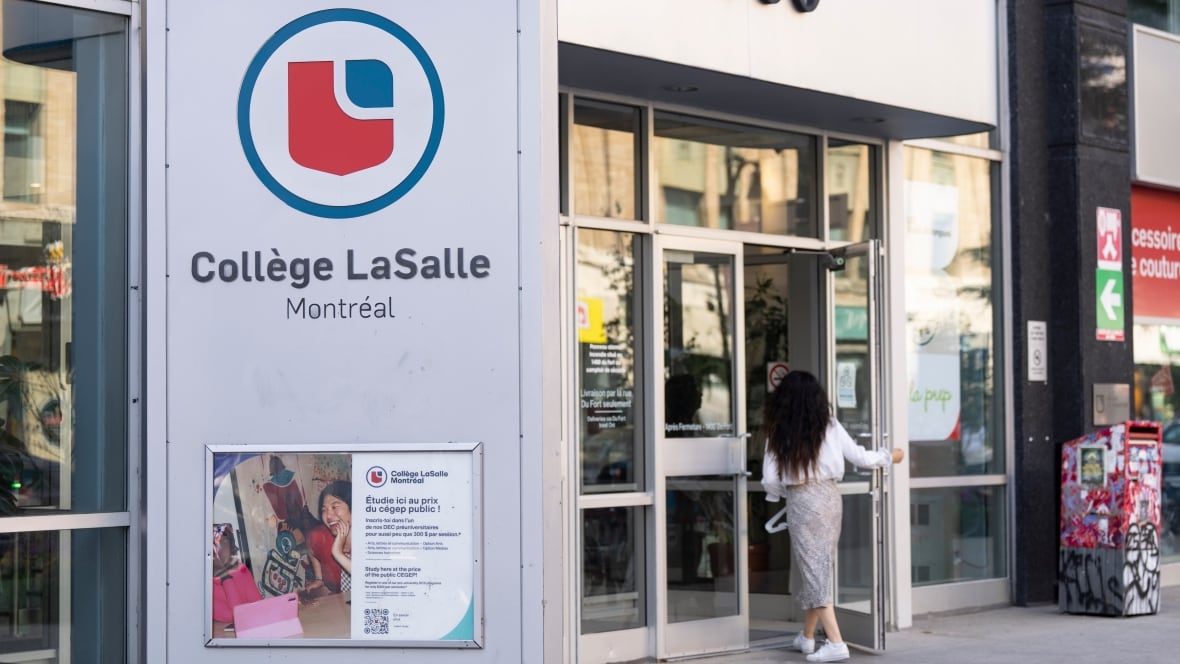Education
LaSalle College Students Face Unforeseen Part-Time Status Shift

Less than a month before the start of classes, dozens of students at LaSalle College in Montreal have been unexpectedly transitioned from full-time to part-time status. This change comes as the college strives to comply with Quebec’s language reform and government-imposed quotas. The decision has left many students, including Alex Abraham, facing uncertainty about their educational and professional futures.
Abraham, a 33-year-old student entering the second year of his network management program, expressed shock upon receiving the notification of his status change via email last week. “We all came here with lots of expectations and dreams,” he said, highlighting the emotional toll this abrupt alteration has taken on his plans to build a career in Quebec.
Impact of Part-Time Status
The shift to part-time status carries significant implications for students. Under this designation, they are ineligible for Canada’s post-graduation work permit and face restrictions on off-campus work unless specific conditions are met. For Abraham, this means he may have to abandon the factory job he relied on to support himself while studying. “How can I meet my expenses?” he questioned, voicing deep concern about the financial strain this change will impose.
LaSalle College has stated that the measure affects approximately 90 students and pertains only to the upcoming fall semester. In a statement, spokesperson Caroline Gervais noted that the adjustments were necessary to ensure compliance with the Charte de la langue française and the quotas on English-language AEC programs, which are vocational post-secondary diplomas. The college has stated that it had the capacity to accommodate students as full-time, but restrictions from the government led to the sudden changes.
During the 2024-25 academic year, LaSalle College exceeded its quota for students in English-language programs by 1,066, leading to a fine of $21,113,864 from the Quebec government. This fine follows an earlier penalty of $8.7 million for similar infractions, bringing the college’s total debt to nearly $30 million. The college is currently contesting these fines in a civil lawsuit filed in Quebec’s Superior Court.
Concerns Over Communication and Fairness
According to the lawsuit, around 70 percent of students enrolled in English-language AEC programs are international students, like Abraham. He learned about LaSalle College through an agency while living in India and moved to Canada for better educational opportunities. “The standard of living is good here in Canada compared to India,” he explained, emphasizing his commitment to adapting to the local culture and language.
Despite being aware of the college’s financial challenges, Abraham did not anticipate that his enrollment status would change without warning. Gervais indicated that factors outside the institution’s control, such as student performance and changes in academic pathways, influenced the availability of classes and affected students’ statuses. She clarified that changes do not imply that LaSalle College exceeded its overall AEC quota.
Abraham, however, feels that the decision appears arbitrary and lacks clarity. He was informed that his academic performance did not contribute to the change, yet he remains unsettled about being grouped with those affected. He has expressed a desire for transparency, stating, “I have the right to know the reason,” and voiced his frustration over what he perceives as the college’s attempt to mitigate its legal and financial issues by altering student statuses.
In response to the situation, LaSalle College has arranged a meeting for affected students with representatives from Immigration Canada. Abraham hopes this meeting will shed light on the matter and provide a clearer understanding of the rationale behind the changes. “I am not the reason for the fine,” he asserted, underscoring his belief that the responsibility lies with the institution, not the students.
The ongoing developments at LaSalle College highlight the complexities and challenges faced by educational institutions in navigating regulatory requirements while balancing the needs of their student populations. As the fall semester approaches, students like Abraham continue to grapple with the implications of these unexpected changes on their academic and professional journeys.
-

 Science3 months ago
Science3 months agoToyoake City Proposes Daily Two-Hour Smartphone Use Limit
-

 Top Stories3 months ago
Top Stories3 months agoPedestrian Fatally Injured in Esquimalt Collision on August 14
-

 Health3 months ago
Health3 months agoB.C. Review Reveals Urgent Need for Rare-Disease Drug Reforms
-

 Technology3 months ago
Technology3 months agoDark Adventure Game “Bye Sweet Carole” Set for October Release
-

 World3 months ago
World3 months agoJimmy Lai’s Defense Challenges Charges Under National Security Law
-

 Lifestyle3 months ago
Lifestyle3 months agoVictoria’s Pop-Up Shop Shines Light on B.C.’s Wolf Cull
-

 Technology3 months ago
Technology3 months agoKonami Revives Iconic Metal Gear Solid Delta Ahead of Release
-

 Technology3 months ago
Technology3 months agoApple Expands Self-Service Repair Program to Canada
-

 Technology3 months ago
Technology3 months agoSnapmaker U1 Color 3D Printer Redefines Speed and Sustainability
-

 Technology3 months ago
Technology3 months agoAION Folding Knife: Redefining EDC Design with Premium Materials
-

 Business3 months ago
Business3 months agoGordon Murray Automotive Unveils S1 LM and Le Mans GTR at Monterey
-

 Technology3 months ago
Technology3 months agoSolve Today’s Wordle Challenge: Hints and Answer for August 19









